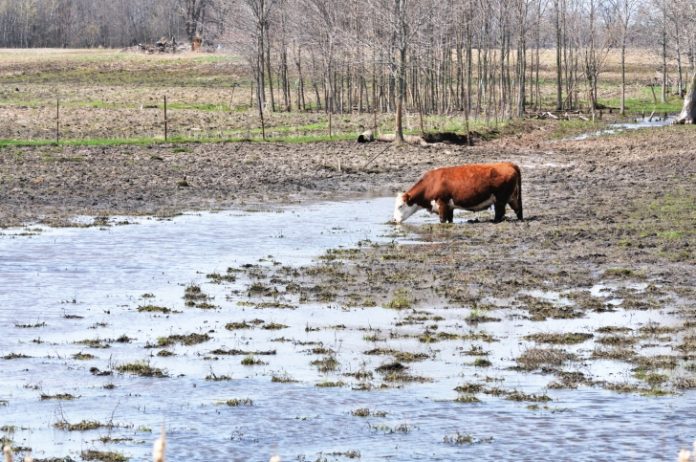The U.S. Environmental Protection Agency (EPA) and the U.S. Army Corps of Engineers (Army Corps) announced they are revising, once again, the definition of “waters of the United States.” The Waters of the United States (WOTUS) rule detailed the federal government’s authority under the 1972 Clean Water Act (CWA) to regulate wetlands across the nation on federal, state, private lands.
According to the November 18, 2021, announcement, the EPA and the Army Corps are effectively re-instituting the pre-2015 understanding of WOTUS as defined under the Obama administration that had been replaced under President Donald Trump.
It may seem surprising to some since the Obama-era WOTUS rule never actually came into effect. It was blocked by multiple federal courts when challenged my multiple states and private sector interests. The courts found the WOTUS rule expanded federal authority over private and state land beyond what the CWA, and Supreme Court rulings, allowed.
Republicans Object
The Biden administration’s move drew a swift and sharp rebuke from the Republican caucus in the U.S. Senate.
All fifty Republican senators sent February. 3, 2022 letter to the EPA and Army Corps, saying the agencies are acting irresponsibly, trying to exercise authority beyond the scope of the law.
The letter was authored by Sen. Roger Wicker (R-MS) and Sen. Cindy Hyde-Smith (R-MS), the original cosponsors of S.2567, the Navigable Waters Protection Act, intended to clarify the federal government’s jurisdiction over navigable waters and adjacent lands in law.
“It would be irresponsible for EPA and USACE to proceed down a regulatory path that could be invalidated or significantly altered as early as this summer,” said the Senate Republican’s letter. “We are foremost troubled to see that the proposed rule exceeds the regulatory authority granted to EPA and USACE by the Clean Water Act.
“The proposed rule seeks to federalize waters in a land grab that arguably surpasses its 2015 predecessor, improperly encompassing water features traditionally within the sole purview of states, while reverting from the comparative straightforward application of the 2020 Navigable Waters Protection Rule … and interjecting new uncertainties for nearly every private sector stakeholder,” said the Senators’ letter.
Governors Oppose WOTUS Revision
Several governors also issued public statements opposing the Biden administration’s re-imposition of WOTUS, for instance Montana Gov. Greg Gianforte and Alaska Gov. Mike Dunleavy.
The Biden administration’s water rule is vague, ambiguous, and overreaching, said Gianforte, in an official statement released on the state’s website.
“If the agencies adopt the Proposed Rule, it is the citizenry that will foot the bill for the agencies’ equivocation,” Gianforte wrote. “No Montanan, and indeed, no American, should be required to hire a consultant simply to advise whether their water is jurisdictional, and then worry whether the consultant correctly interpreted the subjective regulations.
“Montanans should not be precluded from pursuing their livelihoods because they cannot afford to obtain a permit in association with the pothole in the middle of their dryland farm,” said Gianforte.
The Biden water rule will impose disproportionate harm on Alaskans, because the federal government controls so much of the state, said Dunleavy, in a statement.
“Alaska stands to be disproportionately affected by the Proposed Rule, and particularly, by the vast expansion of federal jurisdiction it will inflict on states,” said Governor Dunleavy. “Alaska needs regulations tailored to the diversity and abundance of its waters, not a one-size-fits-all rule imposing excessive federal requirements.”
Usurping of State Powers
The proposed rules do not remotely comport with the directives of the CWA, which clearly assigns states the primary role of protecting waters covered by the Act, says Daren Bakst, a senior research fellow in regulatory policy studies with The Heritage Foundation.
“The new proposed definition is evidence that the left still doesn’t get the problems connected to past interpretations of Waters of the United States,” said Bakst. “For example, this new definition continues to ignore the critical role that Congress envisioned states should play under the Clean Water Act.
‘Right at the outset of the CWA, the statute doesn’t merely recognize the primary role of states in addressing water pollution, it also proclaims that Congressional policy is to preserve and protect these primary responsibilities and rights of states,” said Bakst. “The Biden administration’s proposal isn’t about protecting anything other than federal power.”
Constitutional Concerns
Beyond its impingement of legitimate state authority, the Biden administration is also trampling on local zoning authorities legitimate exercise of power, says Bakst.
“The EPA and Corps are not just usurping authority vested in the states, they are acting like local zoning boards,” said Bakst. “This is not merely a statutory problem but also a constitutional one.
“When the federal government makes it unreasonably difficult to use and enjoy your property, even for ordinary activities like farming and ranching, this is an attack on private property rights,” said Bakst. “The problem with WOTUS is both its breadth and its vagueness, virtually guaranteeing property owners don’t know what the law even requires, and thus many live in fear any activities they engage in on their land may result in civil penalties or even criminal charges.”
This rule is about giving the federal government even more control over the nation’s land, not preventing water pollution, says Craig Rucker, president of Committee for a Constructive Tomorrow, which co-publishes Environment & Climate News.
“As is typical with the Biden administration, they are catering to the most extreme elements of the radical environmental movement in crafting policy,” said Rucker. “WOTUS was intended to be centered on navigable waters.
“Biden, however, is set to give bureaucrats far greater reach by permitting them to regulate any ditch, mud puddle or swamp they randomly determine has a “critical nexus” to a navigable waterway somewhere,” said Rucker. “This will place huge swaths of land under federal management and greatly threaten private property rights.”
Kevin Stone (kevin.s.stone@gmail.com) writes from Arlington, Texas



























[…] post U.S. EPA’s Revised Water Rule Expands Federal Control over Private and State Lands appeared first on Heartland Daily […]